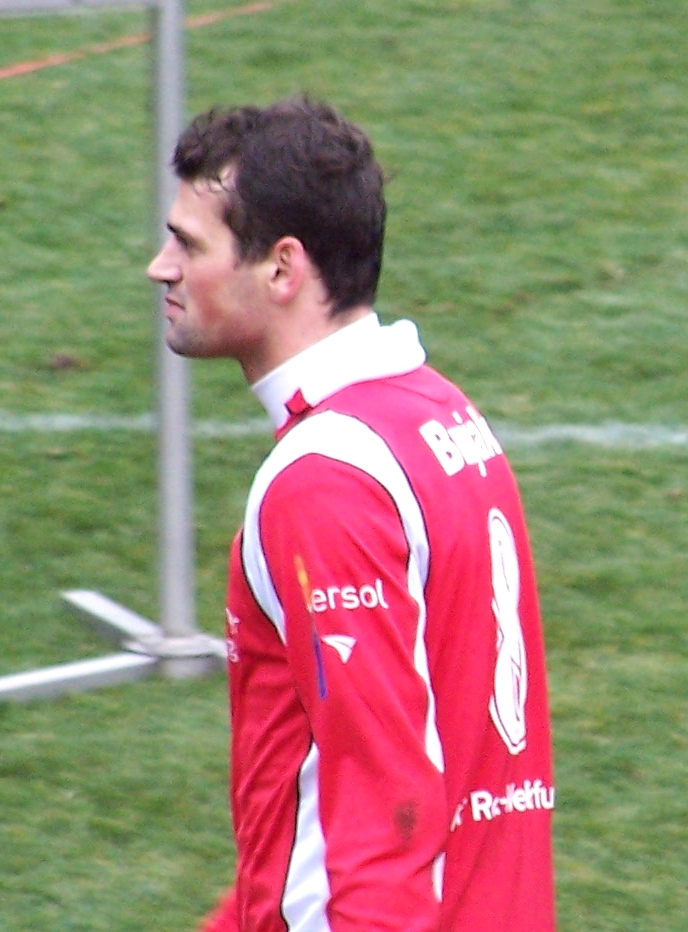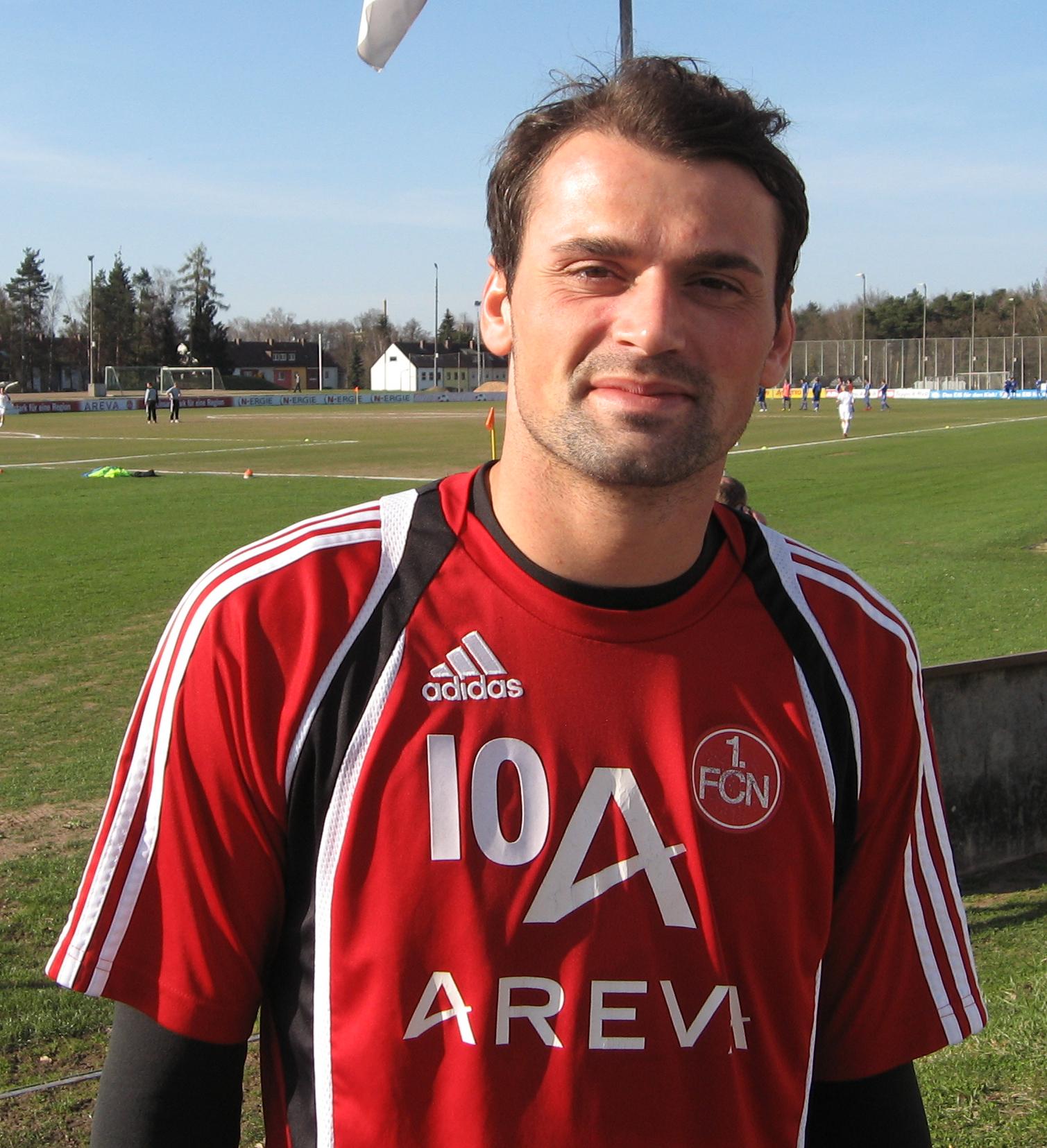1. Personal Background
Albert Bunjaku's early life was marked by a significant move and a relatively late start to his professional football journey.
1.1. Birth and Early Life
Albert Bunjaku was born on 29 November 1983, in Gjilan, then part of the Kosovo Autonomous Province within the Socialist Federal Republic of Yugoslavia. When he was eight years old, Bunjaku, along with his mother and two brothers, moved to Switzerland to join his father, who was already working there. He began playing for his first club, FC Schlieren, at the age of 13, which is considered unusually late for a future professional footballer. Before joining FC Schlieren, his football experience was limited to playing in schoolyards or on five-a-side courts. During his youth, he also developed a keen interest in basketball.
1.2. Origin and Ethnicity
Albert Bunjaku is of Albanian ethnicity, reflecting his heritage from Kosovo.
2. Playing Career
Albert Bunjaku's playing career spanned various clubs in Switzerland and Germany, culminating in international representation for both Switzerland and Kosovo.
2.1. Youth Career and Debut
Bunjaku's youth career began with FC Schlieren from 1996 to 1998. He then moved to the youth ranks of Grasshopper Club Zürich (1998-2000) before joining SC Young Fellows Juventus from 2000 to 2003. His professional debut occurred in 2003 with FC Schaffhausen, which was then competing in the Swiss Challenge League, Switzerland's second division.
2.2. Club Career
Bunjaku's club career saw him play for several teams across Switzerland and Germany, contributing significantly to their successes. He amassed a total of 383 appearances and scored 110 goals throughout his club career.
2.2.1. Swiss Clubs
Bunjaku began his professional career in Switzerland with FC Schaffhausen. During the 2003-04 season, the team achieved promotion to the Swiss Super League, the top tier of Swiss football. Over the subsequent 18 months, Bunjaku made 39 appearances in the Super League. Later in his career, from 2014 to 2017, he returned to Switzerland to play for FC St. Gallen, where he made 64 appearances and scored 1 goal.
2.2.2. German Clubs
In January 2006, Bunjaku moved to Germany, joining 2. Bundesliga side SC Paderborn 07. His tenure there lasted only six months, as he struggled to establish himself under coach Jos Luhukay, who later stated he "didn't have the feeling he was Bundesliga material" at the time. This led to Bunjaku being unemployed in the summer of 2006.

His fortunes changed through a chance conversation when his wife, Arieta, working in a boutique in Paderborn, met the wife of former Paderborn coach Pavel Dochev. Dotchev, then managing FC Rot-Weiss Erfurt in the third division, was looking for a striker. Bunjaku subsequently moved to Erfurt, where he played from 2006 to 2009, making 74 appearances and scoring 34 goals. He gained wider public attention on 10 August 2008, during a DFB-Pokal match against Bayern Munich. Coming on as a second-half substitute in what was Jürgen Klinsmann's competitive debut as Bayern coach, Bunjaku scored two goals against the record champions, though Erfurt ultimately lost 3-4.
Following his time at Erfurt, Bunjaku transferred to 1. FC Nürnberg in 2009, a club that had just been promoted to the Bundesliga. In his first season, he was the team's top scorer with 12 goals. However, in subsequent years until 2012, his playing time and goal count significantly decreased due to injuries. From 2012 to 2014, Bunjaku played for 1. FC Kaiserslautern in the 2. Bundesliga. He served as captain from his first season and scored 13 goals, leading the team to the playoffs, where they were defeated by TSG Hoffenheim. On 12 January 2017, he moved to FC Erzgebirge Aue, where he played until 2018, making 23 appearances and scoring 1 goal. He then joined FC Viktoria Köln from 2018 to 2022, contributing 34 goals in 89 appearances. His final club was Bonner SC in 2022, where he made 11 appearances and scored 1 goal.
2.3. International Career
Albert Bunjaku had a unique international career, representing both Switzerland and, later, the newly formed Kosovo national team.
2.3.1. Switzerland National Team

Bunjaku made his international debut for Switzerland on 14 November 2009, in a 1-0 home friendly loss to Norway, coming on as a substitute for Alexander Frei at half-time. He was part of the Swiss squad for the 2010 FIFA World Cup. Although initially a backup member, he was selected for the final squad due to an injury to Marco Streller. During the tournament, he played the last 13 minutes of the group stage match against Chile, replacing Gelson Fernandes. Overall, he made 6 appearances for the Switzerland senior national team between 2009 and 2010, without scoring any goals. Earlier in his career, he also played for the Switzerland U-21 team from 2004 to 2006, making 15 appearances and scoring 7 goals.
2.3.2. Kosovo National Team
Bunjaku played a significant role in the early years of the Kosovo national team. He participated in Kosovo's first FIFA-approved match, a 0-0 home friendly against Haiti on 5 March 2014. Despite having previously played for Switzerland, his participation was permitted as the match was not classified as a competitive international A-match. Bunjaku made history by scoring Kosovo's first international goal on 21 May 2014, in a match against Turkey. He represented Kosovo until 2016, making a total of 6 appearances and scoring 3 goals.
2.3.3. International goals
Scores and results list Kosovo's goal tally first, score column indicates score after each Bunjaku goal.
| No. | Date | Venue | Cap | Opponent | Score | Result | Competition |
|---|---|---|---|---|---|---|---|
| 1 | 21 May 2014 | Adem Jashari Olympic Stadium, Mitrovica, Kosovo | 2 | Turkey | 1-2 | 1-6 | Friendly |
| 2 | 25 May 2014 | Stade de Genève, Genève, Switzerland | 3 | Senegal | 1-1 | 1-3 | |
| 3 | 3 June 2016 | Stadion am Bornheimer Hang, Frankfurt, Germany | 4 | Faroe Islands | 1-0 | 2-0 |
2.4. Retirement
Albert Bunjaku officially concluded his professional playing career in May 2022.
3. Coaching Career
Following his retirement as a player, Albert Bunjaku transitioned into coaching. He currently holds two significant roles: he serves as the assistant manager for the youth team at Bayer 04 Leverkusen, a prominent German club, and simultaneously manages the Kosovo national under-19 football team.